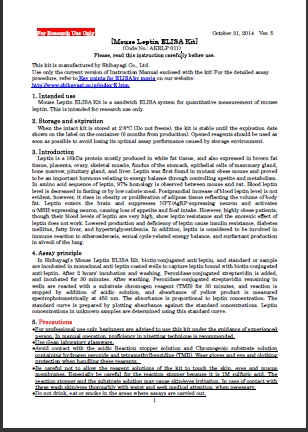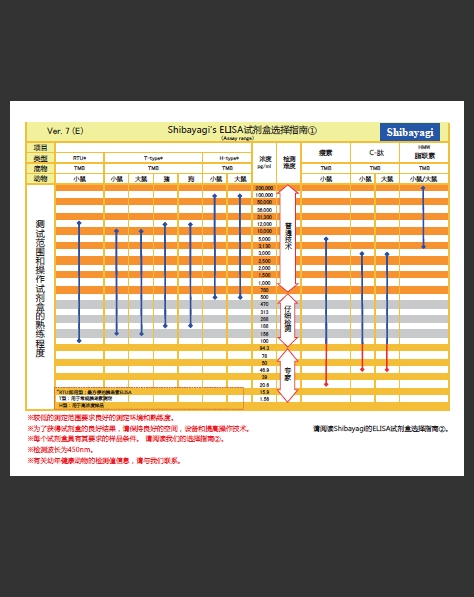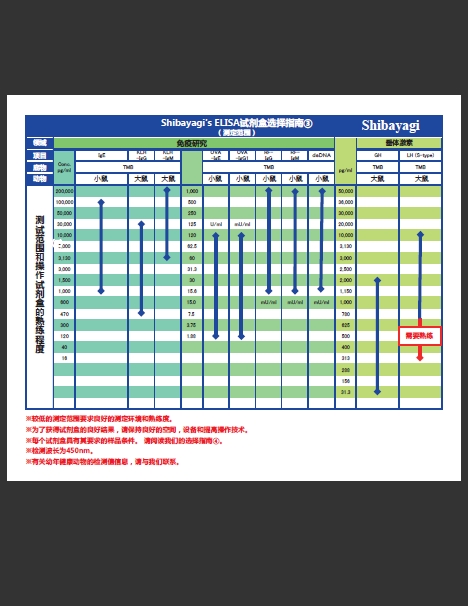| 产品编号 | 产品名称 | 产品规格 | 产品等级 | 产品价格 |
| 631-10389 | (AKRLP-011)Lbis® Mouse Leptin ELISA kit Lbis®小鼠瘦素 ELISA试剂盒 |
96 tests | – | – |
- 产品特性
- 相关资料
- Q&A
- 参考文献
Lbis® Leptin-Mouse
Shibayagi 小鼠瘦素 ELISA试剂盒
瘦素(Leptin)是一种分子量为16KD的蛋白质类激素。主要由白色脂肪组织产生,其它组织如褐色脂肪组织、胎盘、卵巢、骨骼肌、胃底部、乳腺上皮细胞、骨髓、下垂体、肝脏等也能检测到。其在大鼠和小鼠中有97%的同源性。瘦素在突变种肥胖小鼠中发现,是通过调节食欲和新陈代谢来参与至能量平衡的一种重要的激素。血液中瘦素的浓度会因为空腹和低热量饮食而降低,但进食后并不会有明显增加,只有肥胖即脂肪组织量增大的情况下才会增加,可反映身体脂肪量。瘦素进入大脑,通过抑制体内下丘脑神经肽Y(NPY)和刺鼠基因相关蛋白(AgRP)表达神经的受体,另外活化体内α-MSH表达神经,起到降低食欲,减少进食的作用。但是,对于严重肥胖的人,虽然他们血液中瘦素的浓度很高,但对瘦素有抗性,瘦素并不能发挥抑制食欲的作用。全身性脂肪萎缩病引起的瘦素降低或缺乏,会造成胰岛素抗性、糖尿病、脂肪肝、高甘油三酯血症等疾病。除此之外,瘦素也被认为与对动脉粥样硬化的免疫反应、能量平衡和性周期相关,与肺泡表面活性剂的产生也有关系。
◆特点
• 短时间测定(总的反应时间:3小时)
• 微量样品(标准操作:10 μL)可测
• 使用对环境无害的防腐剂
• 全部试剂均为液体,可直接使用
• 精密的测定精度和高再现性
◆构成
|
组成 |
状态 |
容量 |
|
(A)抗体固相化 96 孔板(干燥孔板) |
洗净后使用 |
96 wells(8×12)/1 块 |
|
(B)瘦素标准溶液(小鼠)(5,000 pg/ml) |
稀释后使用 |
500 μL/1 瓶 |
|
(C)缓冲液 |
即用 |
60 mL/1 瓶 |
|
(D)生物素结合抗瘦素抗体 |
稀释后使用 |
200 μL/1 瓶 |
|
(E)过氧化物・抗生物素蛋白结合物 |
稀释后使用 |
200 μL/1 瓶 |
|
(F)显色液(TMB) |
即用 |
12 mL/1 瓶 |
|
(H)反应终止液(1M H2SO4)※小心轻放 |
即用 |
12 mL/1 瓶 |
|
( I )浓缩洗净液(10×) |
稀释后使用 |
100 mL/1 瓶 |
|
封板膜 |
3 张 |
|
|
使用说明书 |
1 份 |
◆交叉反应
※交叉反应是浓度为3,000 pg/mL时的数据
|
动物种类 |
对象物质 |
反应性和反应率(%) |
|
Mouse |
Leptin |
100 |
|
α-MSH |
― |
|
|
IFN-γ |
― |
|
|
MCH |
― |
|
|
TNF-α |
― |
|
|
Rat |
Leptin |
31.5 |
|
Human |
Lepin |
+ |
+:存在交叉反应
―:不存在交叉反应
◆样品信息
小鼠的血清、血浆
10 μL/well(标准操作)
※样品量在10~50 μL范围内可以配制
◆测量范围
20.6~5,000 pg/mL(样品量50μL)
103~25,000 pg/mL(样品量10μL)
◆Validation data
精度测试(检测内变动系数)
|
样品 |
A |
B |
C |
|
1 |
3818 |
846 |
405 |
|
2 |
3810 |
856 |
405 |
|
3 |
3979 |
842 |
394 |
|
4 |
4047 |
851 |
392 |
|
5 |
4046 |
856 |
420 |
|
mean |
3940 |
850 |
403 |
|
SD |
118 |
6.18 |
11.2 |
|
CV(%) |
3.0 |
0.73 |
2.8 |
单位:pg/mL
再现性测试(检测内变动系数)
|
测量日/样品 |
D |
E |
|
第0天 |
5007 |
1052 |
|
第1天 |
5126 |
1063 |
|
第2天 |
5069 |
1027 |
|
第3天 |
5000 |
1000 |
|
mean |
5051 |
1035 |
|
SD |
59.3 |
28.0 |
|
CV(%) |
1.2 |
2.7 |
单位:pg/mL n=2
添加回收测试
样品F
|
添加量 |
实测值 |
回收量 |
回收率(%) |
|
0.00 |
994.9 |
– |
– |
|
337 |
1334.0 |
339.1 |
101 |
|
1061 |
2099.0 |
1104 |
104 |
|
1238 |
2284.0 |
1289 |
104 |
单位:pg/mL n=2
样品G
|
添加量 |
实测值 |
回收量 |
回收率(%) |
|
0.00 |
1996 |
– |
– |
|
2731 |
4741 |
2745 |
101 |
|
4682 |
6444 |
4448 |
95.0 |
|
5462 |
7717 |
5721 |
105 |
单位:pg/mL n=2
稀释直线性测试
用稀释缓冲液分5次连续稀释2个血清样品的测量结果,线性回归方程的R2在0.9992~0.9997之间。
欲了解更多相关产品信息,请点击文字:Lbis® 疾病相关动物模型ELISA试剂盒系列
相关资料
 |
 |
 |
| 说明书 |
ELISA试剂盒选择指南①② |
ELISA试剂盒选择指③④ |
参考文献
|
1. |
Inhibition of Gastric Inhibitory Polypeptide Receptor Signaling in Adipose Tissue Reduces Insulin Resistance and Hepatic Steatosis in High-Fat Diet-Fed Mice. Joo E, Harada N, Yamane S, Fukushima T, Taura D, Iwasaki K, Sankoda A, Shibue K, Harada T, Suzuki K, Hamasaki A, Inagaki N. Diabetes. 2017 Apr;66(4):868-879 |
|
2. |
DNA Methylation Suppresses Leptin Gene in 3T3-L1 Adipocytes. Kuroda M, Tominaga A, Nakagawa K, Nishiguchi M, Sebe M, Miyatake Y, Kitamura T, Tsutsumi R, Harada N, Nakaya Y, Sakaue H. PLoS One. 2016 Aug 5;11(8):e0160532. |
|
3. |
Sodium alginate prevents progression of non-alcoholic steatohepatitis and liver carcinogenesis in obese and diabetic mice. Miyazaki T, Shirakami Y, Kubota M, Ideta T, Kochi T, Sakai H, Tanaka T, Moriwaki H, Shimizu M. Oncotarget. 2016 Mar 1;7(9):10448-58. |
|
4. |
Comparison of two Kampo medicines in a diet-induced mouse obesity model. Fengying Gao, Satoru Yokoyama, Makoto Fujimoto, Koichi Tsuneyama, Ikuo Saiki, Yutaka Shimada andYoshihiro Hayakawa. Traditional & Kampo Medicine, Volume 2, Issue 2, pages 60–66, September 2015 |
|
5. |
Effect of Keishibukuryogan on Genetic and Dietary Obesity Models. Fengying Gao, Satoru Yokoyama, Makoto Fujimoto, Koichi Tsuneyama, Ikuo Saiki, Yutaka Shimada, and Yoshihiro Hayakawa. Evid Based Complement Alternat Med. 2015; 2015: 801291. |
|
6. |
Overexpression of the adiponectin gene mimics the metabolic and stress resistance effects of calorie restriction, but not the anti-tumor effect. Kamohara R, Yamaza H, Tsuchiya T, Komatsu T, Park S, Hayashi H, Chiba T, Mori R, Otabe S, Yamada K, Nagayasu T, Shimokawa I. Exp Gerontol. 2015 Apr;64:46-54. |
|
7. |
Preventive effects of astaxanthin on diethylnitrosamine-induced liver tumorigenesis in C57/BL/KsJ-db/db obese mice. Ohno T, Shimizu M, Shirakami Y, Miyazaki T, Ideta T, Kochi T, Kubota M, Sakai H, Tanaka T, Moriwaki H. Hepatol Res. Jul 2015. |
|
8. |
Sudachitin, a polymethoxylated flavone, improves glucose and lipid metabolism by increasing mitochondrial biogenesis in skeletal muscle. Tsutsumi R, Yoshida T, Nii Y, Okahisa N, Iwata S, Tsukayama M, Hashimoto R, Taniguchi Y, Sakaue H, Hosaka T, Shuto E, Sakai T. Nutrition & Metabolism, 11:32, Jul 2014. |
|
9. |
Type 2 diabetic conditions in Otsuka Long-Evans Tokushima Fatty rats are ameliorated by 5-aminolevulinic acid. Sato T, Yasuzawa T, Uesaka A, Izumi Y, Kamiya A, Tsuchiya K, Kobayashi Y, Kuwahata M, Kido Y. Nutr Res. Vol.34(6), p544-551, Jun 2014. |
|
10. |
Inhibitory Effects of Japanese Herbal Medicines Sho-saiko-to and Juzen-taiho-to on Nonalcoholic Steatohepatitis in Mice. Takahashi Y, Soejima Y, Kumagai A, Watanabe M, Uozaki H, Fukusato T. PLoS One. 2014 Jan 22;9(1):e87279. |
|
11. |
Down-Regulation of Hepatic Stearoyl-CoA Desaturase-1 Expression by Fucoxanthin via Leptin Signaling in Diabetic/Obese KK-A y Mice. Beppu F., Hosokawa M., Yim M-J., Shinoda T., Miyashita K. Lipids, Vol.48(5), p449-455, May 2013. |
|
12. |
Dietary Combination of Fish Oil and Taurine Decreases Fat Accumulation and Ameliorates Blood Glucose Levels in Type 2 Diabetic/Obese KK-Ay Mice. N. Mikami., M. Hosokawa., K. Miyashita. Journal of Food Science, Vol. 77(6), pH114-H120, Jun 2012. |
|
13. |
Effects of Gametophytes of Ecklonia Kurome on the Levels of Glucose and Triacylglycerol in db/db, Prediabetic C57BL/6J and IFN-γ KO Mice. F. Dwiranti., M. Hiraoka., T. Taguchi., Y. Konishi., M. Tominaga., A. Tominaga. Int J B 64 iomed Sci, Vol.8, No.1, Mar 2012. |
|
14. |
Overexpression of FoxO1 in the Hypothalamus and Pancreas Causes Obesity and Glucose Intolerance. H.-J. Kim., M. Kobayashi., T. Sasaki., O. Kikuchi., K. Amano., T. Kitazumi., Y.-S. Lee., H. Yokota-Hashimoto., V. Y. Susanti., Y. Ido Kitamura., J. Nakae., and T. Kitamura. Endocrinology, Vol.153, No.2, p659-671, Feb 2012. |
|
15. |
Spirulina improves non-alcoholic steatohepatitis, visceral fat macrophage aggregation, and serum leptin in a mouse model of metabolic syndrome. M. Fujimoto., K. Tsuneyama., T. Fujimoto., C. Selmid., M. E. Gershwin., Y. Shimada. Digestive and Liver Disease, 2012. |
|
16. |
Prevention mechanisms of glucose intolerance and obesity by cacao liquor procyanidin extract in high-fat diet-fed C57BL/6 mice. Y. Yamashita., M. Okabe., M. Natsume., H. Ashida. Archives of Biochemistry and Biophysics, 2012. |
|
17. |
Preventive Effects of Curcumin on the Development of Azoxymethane-Induced Colonic Preneoplastic Lesions in Male C57BL/KsJ-db/db Obese Mice. M. Kubota., M. Shimizu., H. Sakai., Y. Yasuda., D. Terakura., A. Baba., T. Ohno., H. Tsurumi., T. Tanaka., H. Moriwaki. Nutrition and Cancer, Vol. 64(1), 2012. |
|
18. |
Caffeic Acid Phenethyl Ester Suppresses the Production of Adipocytokines, Leptin, Tumor Necrosis Factor -Alpha and Resistin, during Differentiation to Adipocytes in 3T3-L1 Cells. S, Juman., N, Yasui., H, Okuda., A,Ueda., H, Negishi., T, Miki. and K, Ikeda. Biological and Pharmaceutical Bulletin Vol. 34 (2011) , No.4, 490. |
|
19. |
Mate Tea(Ilex paraguariensis)Promotes Satiety and Body Weight Lowering in Mice:Involvement of Glucagon-Like Peptide-1. G, M, E, Hussein., H, Matsuda., S, Nakamura., M, Hamao., T, Akiyama., K, Tamura., and M, Yoshikawa. Biol.Pharm.Bull. Vol.34(12), p1849-1855, 2011. |
